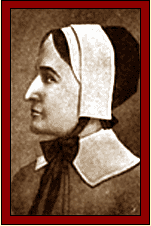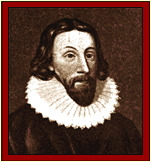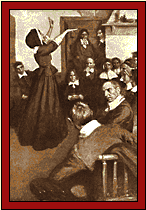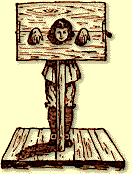 Anne Hutchinson stood trial alone, with no lawyer to defend her. She faced a
panel of 49 powerful and well-educated men. She was accused of sedition, or
trying to overthrow the government. And she faced banishment if convicted.
Anne Hutchinson stood trial alone, with no lawyer to defend her. She faced a
panel of 49 powerful and well-educated men. She was accused of sedition, or
trying to overthrow the government. And she faced banishment if convicted.
Hutchinson's "crime" was expressing religious beliefs that were different from
the colony's rulers. In the year 1637, in Massachusetts Bay Colony, that was
against the law--especially for a woman.
Hutchinson, a Puritan, came to America in search of a place where she could
worship freely. But when she arrived, she found the Bay Colony's religious
rules very intolerant. The ideas she brought with her from England quickly
landed her in trouble.
Hutchinson believed that people could communicate directly with God--without
the help of ministers or the Bible. This was in direct contradiction with the
established religion. Local ministers taught that people could only find God by
following the teachings of the Bible. And that only they could interpret
the Bible correctly. At meetings she held in her Boston home, Hutchinson
criticized the teachings of the colony's ministers.
In Massachusetts Bay, as was the custom at the time, all ministers were men. The Church controlled the
political power. There was no Constitution or Bill of Rights. Only those who
belonged to "approved" churches could vote. Magistrates, or government
officials, used the Bible as their legal textbook. And people who broke the law
could be punished severely--jailed, whipped, or even executed. Many considered
Hutchinson's teachings illegal.
 Anne Hutchinson's meetings deeply divided the colony--and caused alarm among
the colony's leaders. Many people, including the governor, Henry Vane,
supported Hutchinson. But others--including powerful religious leaders and the
powerful former governor John Winthrop, opposed her. They believed that women
should obey men at all times, and that women should be forbidden to teach about
religion. And they feared that if people followed Anne Hutchinson, the
ministers would lose their influence over the people. The colony might even
dissolve into a civil war.
Anne Hutchinson's meetings deeply divided the colony--and caused alarm among
the colony's leaders. Many people, including the governor, Henry Vane,
supported Hutchinson. But others--including powerful religious leaders and the
powerful former governor John Winthrop, opposed her. They believed that women
should obey men at all times, and that women should be forbidden to teach about
religion. And they feared that if people followed Anne Hutchinson, the
ministers would lose their influence over the people. The colony might even
dissolve into a civil war.
As Hutchinson's following grew, the leaders took action. They stopped William
Wheelright, Hutchinson's brother-in-law, from becoming a minister. Then they
 banished him. In 1637, they reelected John Winthrop governor. Still Hutchinson
refused to stop criticizing the ministers.
banished him. In 1637, they reelected John Winthrop governor. Still Hutchinson
refused to stop criticizing the ministers.
In August of 1637, the ministers called a conference, to discuss Hutchinson's
teachings. They discovered some 82 "erroneous opinions" Hutchinson had made.
The magistrates called other Hutchinson followers to trial, convicting and
punishing those who stood by her. Then they tried Hutchinson herself.
The lead prosecutor was Governor John Winthrop. For nearly all of the first
day, Winthrop was the only accuser who spoke. Hutchinson he said, held meetings
that were "not tolerable" in the sight of God. In addition, she had stepped
beyond the bounds of what was allowed for women.
As the trial continued, more men spoke against Hutchinson. But she used the
Bible and the men's own words to skillfully defend herself. She stated that
holding meetings in the home to discuss religion had been a common Puritan
practice in England. She told the men that God had spoken to her directly, and
that only God could be her judge. But in the end, the verdict was against her.
She was banished from Massachusetts Bay.
 Hutchinson left in spring of 1638. The religious persecutions continued. Quakers were
singled out for very harsh punishment, partly because their religion forbid
them from swearing oaths to the government or serving in the military. Just
being a Quaker was punishable by whipping, mutilation, or death. Between 1658
and 1661, four Quakers were hanged.
Hutchinson left in spring of 1638. The religious persecutions continued. Quakers were
singled out for very harsh punishment, partly because their religion forbid
them from swearing oaths to the government or serving in the military. Just
being a Quaker was punishable by whipping, mutilation, or death. Between 1658
and 1661, four Quakers were hanged.
But even amidst persecution, the idea of religious freedom grew. After the
colonies won their freedom from Great Britain, the, new leaders of the United
States of America put religious freedom in writing. Article VI of the
Constitution declared that "no religious test shall ever be required as a
Qualification to and Office or Public Trust under the United States." Amendment
I stated that "Congress shall make no law respecting an establishment of
religion, or prohibiting the free exercise thereof."
 After she left Massachusetts Bay Colony, Anne Hutchinson lived out her years in
exile, first in Aquidneck, Rhode Island and later on Long Island, where she
died during an attack by Native Americans in September, 1643. Hutchinson had
not succeeded in changing the laws of her time. But her courageous actions
helped set the stage for an America in which religious freedom was a reality.
After she left Massachusetts Bay Colony, Anne Hutchinson lived out her years in
exile, first in Aquidneck, Rhode Island and later on Long Island, where she
died during an attack by Native Americans in September, 1643. Hutchinson had
not succeeded in changing the laws of her time. But her courageous actions
helped set the stage for an America in which religious freedom was a reality.



